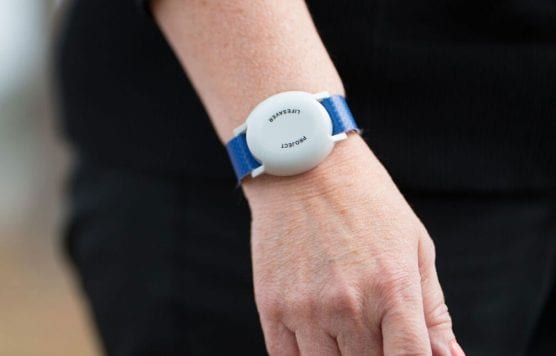 Los Angeles County on Wednesday officially launched “L.A. Found,” a groundbreaking countywide initiative which aims to quickly locate individuals with autism, dementia, or Alzheimer’s disease when they wander and go missing.
Los Angeles County on Wednesday officially launched “L.A. Found,” a groundbreaking countywide initiative which aims to quickly locate individuals with autism, dementia, or Alzheimer’s disease when they wander and go missing.
Supervisor Janice Hahn, Sheriff Jim McDonnell and Director of the L.A. County Workforce Development, Aging and Community Services Department Cynthia Banks made the announcement.
L.A. Found features a system of trackable bracelets that can be located using receivers carried in Sheriff’s Department helicopters and designated ground units.
To learn how to qualify for a bracelet, caregivers can visit www.LAFound.com.
L.A. Found is the culmination of community input and expert recommendations through the Bringing Our Loved Ones Home Task Force, originally proposed through a motion authored by Supervisor Janice Hahn and coauthored by Supervisor Kathryn Barger.
In February 2018, the Board of Supervisors unanimously approved a comprehensive set of strategies proposed by the BOLOH Task Force, including a countywide pilot program to provide trackable bracelets to county residents (now known as L.A. Found).
“If you have cared for someone with dementia or autism, you know the fear of what might happen if you turn your back for just one minute,” Hahn said. “L.A. Found will not only save lives, it will finally give caregivers some peace of mind. If someone you love goes missing, L.A. County is ready to step in and help find them.”
Wandering is a common problem associated with dementia, Alzheimer’s, and autism. According to the Alzheimer’s Association, 60 percent of people with dementia will wander at some point while a study by the Interactive Autism Network found that 49 percent of children with autism will engage in wandering behavior.
While the vast majority of these individuals are recovered, wandering cases can end in tragedy.
“Our LASD mission is to be the eyes and ears in the sky and on the ground. This technology literally enables lost loved ones to communicate their location to us and enable us to do all we can as first responders, to bring peace, comfort and families back together again,” McDonnell said.
L.A. County has more than 177,000 residents with Alzheimer’s disease. There’s also a large population of people with autism and other developmental disorders that make them susceptible to wandering.
The L.A. Found initiative establishes a voluntary system of trackable bracelets, provided by the non-profit organization Project Lifesaver, for at-risk individuals.
While the bracelet is not under constant monitoring, when an individual wearing a bracelet goes missing, caregivers call 9-1-1 and the police agency or sheriff’s station will inform the Sheriff’s Department Mental Evaluation Team which will deploy receivers to help locate the missing person.
The Project Lifesaver bracelet uses radio frequency technology to transmit an electronic “chirping” signal to help rescuers locate the wearer.
Electronic handheld receivers are used to locate missing persons with the bracelets and are being used by law enforcement agencies across the country with great success. Weather permitting, airborne searching improves the distance a signal can be detected using specially equipped sheriff’s service helicopters in the event someone wearing the special bracelet is lost.
In order to qualify for the program, caregivers must first schedule a phone interview with either the Sheriff’s Department or WDACS through the website at www.LAFound.com.
Once an at-risk individual qualifies, the caregiver will be allowed to purchase and register the bracelet with the Sheriff’s Department.
The bracelets cost $325, plus shipping and handling. There are leasing opportunities available through Project Lifesaver. There is currently a waiting list to be considered for a free bracelet. Call 1-833-569-7651 or email LAFound@WDACS.LACOUNTY.GOV to be placed on the waiting list.
In addition to launching the Project Lifesaver bracelet system countywide, the L.A. Found Program will also improve and coordinate the county’s response to missing persons with Alzheimer’s, dementia, autism, or other cognitive impairments.
“We want caregivers to know that the county is here for you,” Banks said. “Through L.A. Found we are not only providing access to tracking bracelets but (also) collaborating with law enforcement agencies, municipalities and other partners to improve emergency coordination while providing information and resources to support individuals caring for someone with Alzheimer’s Disease, Dementia or Autism.”
About Workforce Development Aging and Community Services (WDACS)
WDACS is committed to connecting communities and improving the lives of all generations in Los Angeles County. WDACS provides employment services to adults and youth and works with employers in times of hiring and downsizing. WDACS also provides dispute resolution/mediation services. WDACS also investigates abuse claims against older adults and dependent adults. WDACS provides nutrition and other life-enhancing services to older adults thru the Area Agency on Aging. WDACS’ Human Relations Commission is dedicated to fostering positive inter-group relations and the Los Angeles Commission for Older Adults provides advocacy and education to older adults in Los Angeles County.
Like this:
Like Loading...
Related





 Tweet This
Tweet This Facebook
Facebook Digg This
Digg This Bookmark
Bookmark Stumble
Stumble RSS
RSS




























REAL NAMES ONLY: All posters must use their real individual or business name. This applies equally to Twitter account holders who use a nickname.
0 Comments
You can be the first one to leave a comment.